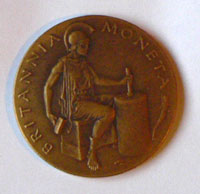
Ipswich Cross 1794
This token was issued by James Conder, a draper and haberdasher of Ipswich. These eighteenth century tokens are called Conder tokens in the USA, as James Conder was the first to catalogue them. He also became an enthusiastic issuer. |

Cardinal Wolsey Born at Ipswich 1471
An adventurous new token from Conder |
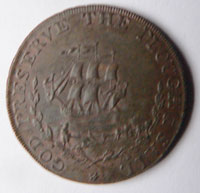
A typical motto, and appropriate scene for the port of Ipswich. 'God preserve the plough and sail'.
There is an inscription around the edge - "Payable at Robert Mannings" |

Payable at Conder's Drapery Warehouse Ipswich |

James Conder Ipswich 1795
Wolsey's Gate
Cardinal Thomas Wolsey (1475-1530), was the son of an Ipswich Butcher. He tried to found a college in Ipswich, but only this gate still remains. |

This token, with the Ipswich town arms, was also used by other Ipswich tradesmen without the edge inscription. |
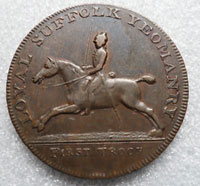
Blything's First Troop of the Suffolk Yeomanry.
Edge has 'God save the King and Constitution' |

A token celebrating the Hoxne and Hartismere cavalry unit of the Suffolk Yeomanry. Pro Aris et Focis. |

A token from Lowestoft with a plea for the fishing industry. 'Success to the fisheries'. |

Blything Hundred Halfpenny. Suffolk 1794. Liberty, Loyalty, Property. |
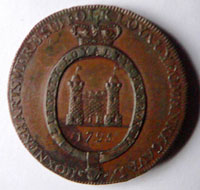
Hoxne & Hartsmere Suffolk Loyal Yeomanry Cavalry.
Liberty, loyalty, property. 1795
(the motto of the property owning classes) |

Lowestoft Token. Sea Bath. 1795. RP. (Then, as now, sea bathing and tourism was a valuable addition to the coastal economy.) |

Bungay Halfpenny
Bigod's Castle |

May the Trade of Sudbury Flourish |

Thomas Seckford Esq Founded Woodbridge Almshouses 1587 |

For change not Fraud
1794
This motto explains why tokens were needed despite not being legal tender. |

Pro Bono Publico. 1793
(This was a popular motto on trade tokens across the country.) |

At whose expense county maps were first engraved.
Grationes et eelemos ascendumt in memoriam corum deo |

Token from Beccles. NB B'ecclesiae |

R Campin Haberdasher Goat Lane Norwich |

A token presumably used on the mailcoaches, but attributed to Middlesex |

The ancient bridge at Beccles |

One of many tokens from Norwich. Halfpenny 1794 |
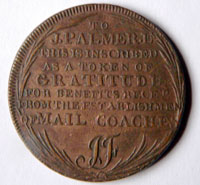
The inscription refers to John Palmer of Bath who first suggested replacing Postboys by Mailcoaches. A famous test run from London to Bath in 1784 proved him right, halving the journey time |


